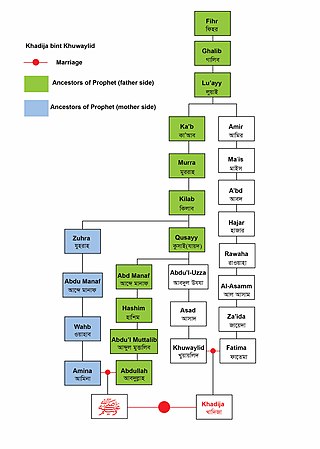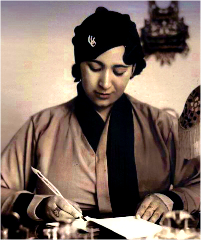Related Research Articles

Abū Bakr ʿAbd Allāh ibn ʿAbī Quḥāfa was the senior companion and was, through his daughter Aisha, a father-in-law of the Islamic prophet Muhammad, as well as the first Caliph of the Rashidun Caliphate. He is known with the honorific title al-Siddiq by Sunni Muslims.
Arabic literature is the writing, both as prose and poetry, produced by writers in the Arabic language. The Arabic word used for literature is Adab, which comes from a meaning of etiquette, and which implies politeness, culture and enrichment.
Maymunah bint al-Harith al-Hilaliyyah, was the eleventh and final wife of Muhammad. Her original name was Barrah, which Muhammad changed it to Maymunah, meaning "good tidings", as his marriage to her marked the first time in seven years when he could enter his hometown of Mecca from Medina.
ʿAbd Allāh ibn ʿAbbās, also known as Ibn ʿAbbās, was one of the cousins of the Islamic prophet Muhammad. He is considered to be the greatest mufassir of the Qur'an.
Abū Muḥammad al-Ḥasan ibn Aḥmad ibn Yaʿqūb al-Hamdānī was an Arab Muslim geographer, chemist, poet, grammarian, historian, and astronomer, from the tribe of Banu Hamdan, western 'Amran, Yemen. He was one of the best representatives of Islamic culture during the last period of the Abbasid Caliphate. His work was the subject of extensive 19th-century Austrian scholarship.
Fatima bint Asad, was the mother of Ali ibn Abi Talib, married to Abu Talib, and an aunt to Muhammad.
ʿAbd al-ʿUzzā ibn ʿAbd al-Muṭṭalib , better known as Abū Lahab was the Islamic prophet Muhammad's half paternal uncle. He was one of the Meccan Qurayshi leaders who opposed Muhammad and was condemned in Surat Al-Masad of the Quran.
Banu Adi was a clan of the Quraysh tribe descended from Adi ibn Ka'b. The Banu Adi were with the Meccans as part of the escort that preceded the Battle of Badr; they did not join Quraysh further.
Shayba ibn Hāshim, better known as ʿAbd al-Muṭṭalib, was the fourth chief of the Quraysh tribal confederation. He was the grandfather of the Islamic prophet Muhammad.

The Mahra Sultanate, known in its later years as the Mahra State of Qishn and Socotra or sometimes the Mahra Sultanate of Ghayda and Socotra was a sultanate that included the historical region of Mahra and the Guardafui Channel island of Socotra in what is now eastern Yemen. It was ruled by the Banu Afrar dynasty for most of its history.
Wahb ibn Munabbih was a Yemenite Muslim traditionist of Dhimar in Yemen; died at the age of ninety, in a year variously given by Arabic authorities as 725, 728, 732, and 737 C.E. He was a member of Banu Alahrar, a Yemeni of Persian origin. He is counted among the Tabi‘in and a narrator of Isra'iliyat.

Khadijah bint Khuwaylid was the first wife and the first follower of the Islamic prophet Muhammad. Khadija was the daughter of Khuwaylid ibn Asad, a noble of the Quraysh tribe in Makkah and a successful merchant.
Sakhr ibn Harb ibn Umayya, commonly known by his kunyaAbu Sufyan, was a prominent opponent-turned companion and father-in-law of the Islamic prophet Muhammad. He was the father of the first Umayyad caliph Mu'awiya I and namesake of the Sufyanid line of Umayyad caliphs which ruled from 661 to 684.
Nadia Al-Kokabany is a Yemeni novelist, short story writer and academic. She was born in Taiz and studied architecture at Sanaa University. She completed a PhD in architecture at Cairo University in 2008, before returning to take up an academic position at Sanaa University.
Aziza or Azizah may refer to:
Al-Hārith ibn Kalada was an Arab physician and a companion of the Islamic prophet Muhammad. He is said to have traveled to Gundeshapur in search of medical knowledge before the advent of Islam.
Rawhiya al-Qallini (1915–1980) was an Egyptian poet and cultural center director.

Gamila El Alaily or Jamila El Alaily or Jamila al-‘Alayili was an Egyptian poet and novelist who confronted ideas that were then socially accepted by educated men about women. As the first female member of the previously all male Apollo Poet Society, she was a pioneer women in the literary scene in Egypt and an influential modernist.
Busr ibn Abi Artat al-Amiri was a prominent Arab commander in the service of Mu'awiya I, the governor of Islamic Syria (640s–661) and the first Umayyad caliph (661–680). A veteran of the early Muslim conquests in Syria and North Africa, Busr became an ardent partisan of Mu'awiya against Caliph Ali during the First Muslim Civil War. He led a large-scale campaign against Ali's supporters in Arabia, gaining the submission of Medina, Mecca and Ta'if to Mu'awiya's caliphate and carrying out punitive measures against the inhabitants of Yemen. His actions in Arabia, which included executing two young sons of Ali's cousin, the governor of Yemen Ubayd Allah ibn Abbas, and taking captive women from the Muslim tribe of Hamdan, were condemned as unprecedented atrocities by the traditional Muslim sources, particularly Shia Muslim writers.
References
- ↑ Arab women writers: a critical reference guide, 1873-1999, by Radwa Ashour, Ferial Jabouri Ghazoul, Hasna Reda-Mekdashi
- ↑ "Gender and the Writing of Yemeni Women Writers by Antelak Al-Mutawakel, PhD dissertation, University of Tilburg, 2005". Archived from the original on 2012-03-20. Retrieved 2011-02-27.